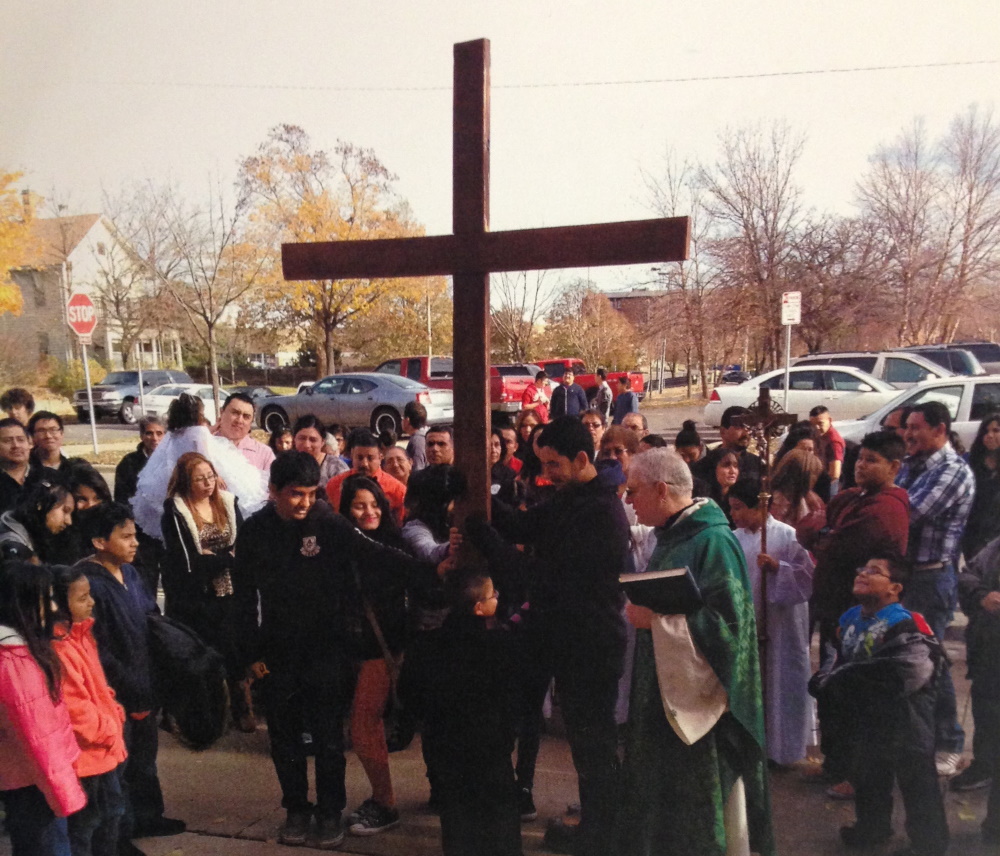When the Rite of Christian Initiation of Adults is retranslated, the new title of the rite will be Order of Christian Initiation of Adults. We’ve already seen some people referring to the new translation as “OCIA.”
This is probably fine if you are referring to the written text of the document, “Order of Christian Initiation of Adults.” However, we have a more than 40-year history of referring to the actual initiation process by the initials “RCIA.” This is unfortunate. By using the initials alone, we create an insider vocabulary. And it is too easy to think of those initials as standing for an academic learning project instead of encountering the person of Jesus Christ.
What should we say instead of “OCIA”?
At Team Initiation, we are advocating that parish teams avoid using “OCIA” to describe the process of becoming a disciple. Whenever we say that, however, someone always asks what we should say instead. Well, here are 75 examples. Please comment on your favorites or add new ones in the comment section below.
At TeamRCIA, we are advocating that parish teams avoid using “OCIA” to describe the process of becoming a disciple. Whenever we say that, however, someone always asks what we should say instead.
- Catechumenate
- Catechumenate process
- Journey of faith
- Journey to baptism
- Emmaus journey
- Spiritual journey
- Spiritual discovery
- Spiritual encounter
- Spiritual exploration
- Following the Spirit
- Living in the Spirit
- Living in Spirit and faith
- Following Christ
- Way of faith
- Way of the Cross
- Way of the gospel
- Way of salvation
- Gospel living
- Baptismal living
- Missionary discipleship
- Discipleship training
- Christian discipleship process
- Christian initiation process
- Christian initiation
- Initiation process
- Christian apprenticeship
- Christian apprenticeship training
- Desire for the infinite
- Faith formation
- Christian faith formation
- Faith accompaniment
- Encounter with Christ
- Encountering Christ
- Walking in faith
- Walking by faith
- Walking with Christ
- Finding God
- Finding the truth
- Finding the fullness of truth
- Living a life of truth
- Discovering the truth
- Finding meaning
- Living a meaningful life
- Discovering meaning
- Finding grace
- Living a grace-filled life
- Living gracefully
- Conversion process
- Conversion journey
- Entering the mystery of faith
- Entering the mystery of Christ
- Entering the mystery of the Trinity
- Holy living
- Holiness training
- Holiness apprenticeship
- The way of holiness
- Encountering the Holy
- Enlightenment process
- Living in the light
- Joining the people of God
- Joining the people of faith
- Joining the circle of saints
- The healing journey
- Spiritual healing process
- Becoming apostles
- Apostleship process
- Apostleship training
- Apostolic living
- Apostolic journey
- Made not born
- Made not born process
- Making Christians
- Making disciples
- Prophetic living
- Prophetic discipleship
Your turn
How are you going to refer to the initiation of new disciples? Which options in this list resonate with your community? Share your thoughts in the comments below.












Why do we need to call it something else? After almost 40 years of people getting used to what RCIA is- it wouldn’t be helpful to change it. After all- it’s still going to be the “Rites” for Christian Initiation however The Order might look different. I see no point in calling it something else- it’s still RCIA. Anyway I think We’ll have a few years to figure it out.
I’ve been using “The Catechumenate” for years. Of course, I almost always have to explain what that means.
We already refer to our RCIA process as a ‘Journey in Faith.” Using the word in and not the word of makes a world of difference, just like O instead of R in the initials. Honestly. The initials RCIA are usually are usually in parentheses.
Now, instead of someone inquiring about the RCIA process, they say I’m ready to begin my journey.
Christian Formation
1 and 23 are closest to my choice.
The RCIA is a learning process of faith seeking understanding for seekers of a community of believers:
An initiation in the mysteries of Catholic faith.
It is a journey that celebrates initiation and an ongoing journey with the People of God.
I never liked the acronym as it sounds like a club or company name and isn’t immediately understood as an invitation initiated by God to draw closer to the Holy Trinity in a faith community!
I agree that OCIA is even worse, for all the reasons you name.
Thank you for all your good work!!
Instead of RCIA or OCIA, I prefer Emmaus Journey or Christian Apprenticeship.
Simply call the RCIA “The Way” just like it origionally statred.
I have no idea what it should be called. I do know that I will avoid any name that sounds like or implies it is an event. Events start and finish. I will avoid letting that mindset infiltrate the minds of our Catechumen and Candidates.
Christian initiation to the Catholic Faith
hi. We use Journey of Faith already, with RCIA….but I like the Catechumenate as well. Will be interesting to see where we land. Do you also have the same recommendation for the Spanish RICA since their name isn’t changing? We like to be consistent with both programs at our parish so I assume we’d adjust that as well…but would love to hear others’ thoughts too. Thanks.
I really like Faith Formation with perhaps an added tag of FAITH FORMATION: INQUIRING and then a later tag of FAITH FORMATION: CATECHUMENS etc. Maybe even FAITH FORMATION: NEWBIES. I know Faith Formation is used in a lot of parishes for religious education. It could still happen, but just use something after the colon to signify who is being addressed. FAITH FORMATION: WHOLE PARISH!!
I’ve always thought that when we say, “RCIA” we are not reaching the very people we are trying to attract. “RCIA” or OCIA” means nothing to them. Also, many people call themselves “Christian” although they are not “Catholic.” I believe that calling it the “Catholic Initiation Process” or something similar to that would more directly communicate our intentions.
I like many of those suggested titles. I have been saying “the Christian Initiation Process” for many years and I certainly use many of those other words to explain what the “process” means.
The majority of people entering into the process are coming from another Christian faith tradition. It is not appropriate to imply they are becoming Christian. The majority of these are coming because someone who is already Catholic has invited them, often a family member or future spouse. Their first question is always “How do I become Catholic?” This is also true for the unbaptized who are nevertheless somewhat catechized. Therefore we speak of the process as Becoming Catholic.
I prefer “Catechumenate.” Though I could also go with “Christian Initiation Process.”
Properly, the “Catechumenate” or the “Catechumenal Process.”
The Catholic Church used this term in it’s early history.
Blessings.
Amen to not using OCIA or even RCIA as a noun. The Bishops’ Committee on the Liturgy urged not doing so in early 1990’s. Yet publishers and even the USCCB continued doing it.
I favor 1, 2, 23, 24, and 25. Add “baptismal catechumenate” since this is used in catechetical and Apostolic See documents.
Most of the other options can/should also apply to ongoing faith formation efforts of the baptized.
As a retired diocesan staffer, 130 parishes using 76 different names would not help the faithful focus on “what is going on here.”
Christian Initiation is a term we have used. It captures the heart of both RCIA and OCIA which is Christian Initiation. Less is more!
Great reflection~ And of course there is the, http://www.ocia.org, the Organic Crop Improvement Association… which I guess does sound like initiating growth and discovery… 🙂 I have always preferred not to refer to RCIA at all and go with whatever references can connect more readily with the rest of the parish sacramental preparation efforts. RCIA usually requires multiple explanation anyway, so sacraments of initiation or initiation sacraments and identify more specifically from there…. For children, for adults, or inquiry promotion for “adults who have not been baptized, confirmed,” etc. rather than, for those interested in the RCIA program,” etc. The names of the sacraments are more probably more familiar than “RCIA” and sidestep OCIA the different iterations for children’s RCIA altogether, as well as the “program and graduation” nuances and pitfalls. I have always found it problematic that some pastors can say, “oh we don’t do the RCIA, like any ritual of the church is an option. Presenting it as this is how we initiate adults can maybe help with that as well.
“Becoming a disciple” – your own lead-in to the question, best sums it up for me.
It is, after all, the end goal of the Kerygma.
We are meant to be “mini-me’s” of Jesus – becoming a disciple is how!
Journey to the Sacraments might be a clear and simple description of the process.
The journey to eternal life. (The start)
Called to Discipleship
Sacramental preparation
As an alternative to “Christian initiation” we use “Becoming Catholic”. A wonderful book was published in 2003 titled “Becoming Catholic Even If You Happen To Be One” which gave us the insight that even those already baptized Catholic are on a journey of life-long faith growth. We need to be aware that when we are evangelizing we avoid “insider” vocabulary that may be inspiring to us but confusing or unhelpful to others.
Let’s try ITBC or ITFJ
Invitation to become Catholic
Invitation to follow Jesus. 😌
What’s in a name? Does it really matter?
Our diocesan paper is featuring articles as if the whole process is entirely new. For example, the entire parish should be involved; it (OCIA) should be a year round program;
more catechists and team members may be needed…